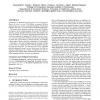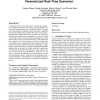47 search results - page 9 / 10 » Non-Constituent Coordination: Theory And Practice |
ATAL
2009
Springer
14 years 11 days ago
2009
Springer
Distributed constraint optimization (DCOP) provides a framework for coordinated decision making by a team of agents. Often, during the decision making, capacity constraints on age...
MOBICOM
2009
ACM
14 years 9 days ago
2009
ACM
In the literature, asymptotic studies of multi-hop wireless network capacity often consider only centralized and deterministic TDMA (time-division multi-access) coordination schem...
ATAL
2007
Springer
13 years 12 months ago
2007
Springer
In this paper, we discuss the use of Targeted Trajectory Distribution Markov Decision Processes (TTD-MDPs)—a variant of MDPs in which the goal is to realize a specified distrib...
SCESM
2006
ACM
13 years 11 months ago
2006
ACM
As technical systems keep growing more complex and sophisticated, designing software for the safety-critical coordination between their components becomes increasingly difficult....
ICPW
2007
13 years 7 months ago
2007
The Rule Responder project (responder.ruleml.org) extends the Semantic Web towards a Pragmatic Web infrastructure for collaborative human-computer networks. These allow semi-autom...


